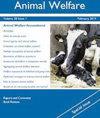Improving hen welfare on cage-free egg farms in Asia: Egg producers’ perspectives
IF 2.3
4区 农林科学
Q2 VETERINARY SCIENCES
引用次数: 0
Abstract
Abstract There is a trend towards the adoption of cage-free housing systems in the egg industry across Asia. While cage-free housing systems can hold significant animal welfare advantages over cages, there can also be challenges in managing these systems. This exploratory study aimed to investigate the perspectives of egg producers on the main challenges and proposed solutions associated with cage-free systems in China, Indonesia, Thailand, Japan, Malaysia, and the Philippines. Cage-free producers found disease prevention and maintaining a healthy profit margin more difficult than producers from cage farms, while it was less difficult to provide environmental enrichment in cage-free systems compared to cage farms. The top challenges for cage-free producers were the cost of production, system management, disease, sales, and egg production, and the top proposed solution was to improve on-farm practices and efficiencies. Eighty-one percent of egg producers believed that more support is needed to maintain their farms than is currently available, and support was most needed in helping to improve sales, improve farm operations, lower farm costs, and provide information for producers in the form of education and training. Most responses identified the government as the stakeholder that should offer support. These results may help direct further studies in this field as well as supplying information to develop relevant initiatives with an emphasis on education and training, thereby improving animal welfare on cage-free farms and increasing the uptake of high welfare cage-free farms across the region.提高亚洲非笼养鸡蛋农场母鸡的福利:鸡蛋生产商的观点
在整个亚洲的蛋业中,有一种采用无笼饲养系统的趋势。虽然与笼子相比,无笼饲养系统具有显著的动物福利优势,但在管理这些系统方面也存在挑战。本探索性研究旨在调查中国、印度尼西亚、泰国、日本、马来西亚和菲律宾的鸡蛋生产者对无笼饲养系统面临的主要挑战的看法,并提出解决方案。非笼养养殖户发现,与笼养养殖户相比,疾病预防和维持健康的利润率更为困难,而在非笼养养殖系统中提供环境富集则比笼养养殖户容易。非笼养养殖者面临的最大挑战是生产成本、系统管理、疾病、销售和鸡蛋生产,而提出的首要解决方案是改善农场实践和效率。81%的鸡蛋生产者认为,维持其农场所需的支持比目前更多,最需要的支持是帮助提高销售、改善农场经营、降低农场成本,并以教育和培训的形式为生产者提供信息。大多数回应认为政府是应该提供支持的利益相关者。这些结果可能有助于指导这一领域的进一步研究,并为制定以教育和培训为重点的相关举措提供信息,从而改善无笼农场的动物福利,并增加整个地区对高福利无笼农场的吸收。
本文章由计算机程序翻译,如有差异,请以英文原文为准。
求助全文
约1分钟内获得全文
求助全文
来源期刊

Animal Welfare
农林科学-动物学
CiteScore
2.30
自引率
8.30%
发文量
43
审稿时长
18-36 weeks
期刊介绍:
Animal Welfare is an international scientific and technical journal. It publishes the results of peer-reviewed scientific research, technical studies and reviews relating to the welfare of kept animals (eg on farms, in laboratories, zoos and as companions) and of those in the wild whose welfare is compromised by human activities. Papers on related ethical, social, and legal issues and interdisciplinary papers will also be considered for publication. Studies that are derivative or which replicate existing publications will only be considered if they are adequately justified.
Papers will only be considered if they bring new knowledge (for research papers), new perspectives (for reviews) or develop new techniques. Papers must have the potential to improve animal welfare, and the way in which they achieve this, or are likely to do so, must be clearly specified in the section on Animal welfare implications.
 求助内容:
求助内容: 应助结果提醒方式:
应助结果提醒方式:


